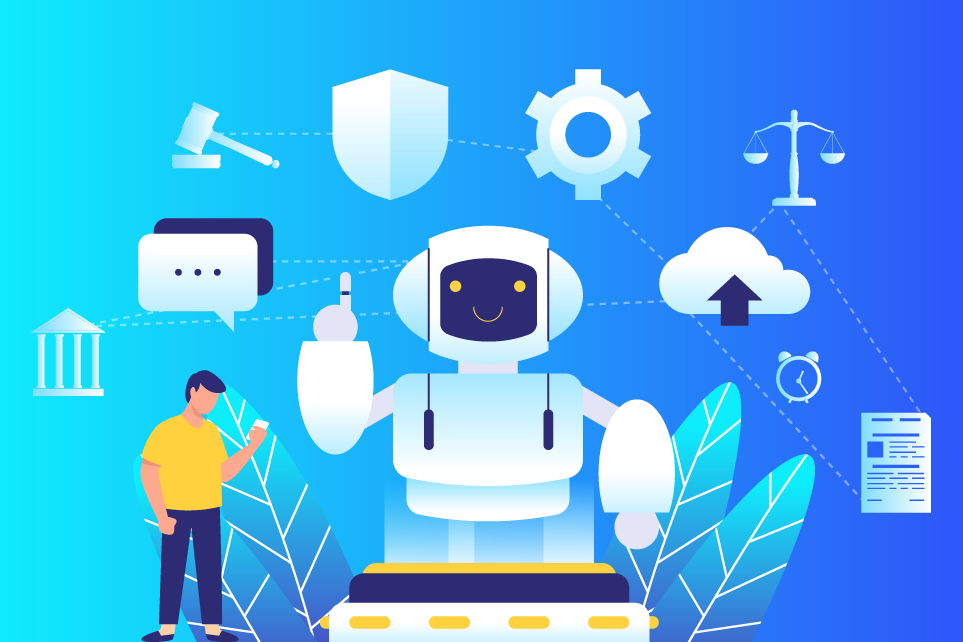Artificial intelligence (AI) is rapidly transforming the legal industry, offering a wide range of benefits to law firms, legal departments, and clients alike. From automating repetitive tasks to enhancing legal research, contract analysis, and document review, AI-powered solutions are streamlining legal operations, reducing costs, and improving outcomes.
We’ll try to explore the role of AI in legaltech and its impact on the legal industry. We’ll examine some of the most promising applications of AI in law, as well as the benefits and challenges of implementing AI solutions in legal organizations. Finally, we’ll provide real-world examples of successful AI implementations in law firms and corporate legal departments.
The Role of AI in Legaltech
AI is a broad term that encompasses a range of technologies and techniques, including machine learning, natural language processing, and cognitive computing. In the legal industry, AI can be used to automate routine tasks such as document review, contract analysis, and legal research, freeing up time for lawyers to focus on more complex, high-value work.
Benefits of AI in the Legal Industry: Automating Routine Tasks: Many legal tasks are repetitive and time-consuming, such as contract review and due diligence. AI-powered solutions can automate these tasks, freeing up lawyers’ time to focus on more complex and strategic work. For example, Kira Systems is an AI-powered contract review tool that is widely used by law firms and corporate legal departments. By automating contract review, Kira Systems can save lawyers hours of time and improve the accuracy and consistency of legal work.
Enhancing Legal Research: AI-powered legal research tools can quickly and accurately find relevant cases and statutes, reducing the time and cost of legal research. For example, ROSS Intelligence is an AI-powered legal research tool that uses natural language processing and machine learning to find relevant cases and statutes. By streamlining legal research, ROSS Intelligence can save lawyers hours of time and improve the quality of legal work.
Predictive Analytics: AI can help lawyers predict the outcomes of legal cases based on past precedents and other data, allowing them to make more informed decisions and better advise their clients. For example, Lex Machina is an AI-powered litigation analytics tool that provides insights into judges, courts, and opponents, helping lawyers make data-driven decisions.
Challenges of AI in the Legal Industry:
While AI offers many benefits to the legal industry as mentioned above, there are also several challenges that must be addressed:
Data Privacy and Security: AI solutions require large amounts of data to be effective, which can raise concerns around data privacy and security. Legal organizations must ensure that they have robust data protection measures in place to mitigate the risk of data breaches.
Ethical Considerations: AI-powered solutions must be designed and implemented in an ethical manner to avoid unintended consequences, such as bias or discrimination. Legal organizations must ensure that they have appropriate governance structures in place to monitor and address ethical issues.
Cost: AI solutions can be expensive to develop and implement, which may be a barrier to adoption for smaller law firms or legal departments. Legal organizations must carefully weigh the costs and benefits of AI implementation to ensure that it is cost-effective and aligned with their business objectives.
Real-World Examples of Successful AI Implementations in Legal Organizations
Despite these challenges, there are many examples of successful AI implementations in law firms and corporate legal departments.
For example, Kira Systems is an AI-powered contract analysis tool that has been adopted by many law firms and legal departments. By automating contract review, Kira Systems has been able to reduce the time and cost of legal work, while also improving accuracy and consistency.
Another example of successful AI implementation is LegalMation, an AI-powered litigation tool. LegalMation uses AI to analyze legal documents and generate responsive pleadings, allowing lawyers to quickly and accurately draft legal documents.
LawGeex: LawGeex is an AI-powered contract review tool that uses natural language processing and machine learning to analyze and review contracts. By automating contract review, LawGeex can save lawyers time and improve the accuracy and consistency of legal work. LawGeex has been used by several large corporations, including eBay and PepsiCo, to streamline their contract review processes.
Luminance: Luminance is an AI-powered legal analytics tool that uses machine learning to analyze large volumes of legal documents. By automating document review and analysis, Luminance can save lawyers time and improve the accuracy and consistency of legal work. Luminance has been used by several large law firms, including Clifford Chance and Slaughter and May, to streamline their due diligence and contract review processes.
Conclusion:
Artificial intelligence is transforming the legal industry by automating routine tasks, enhancing legal research, and providing predictive analytics. While there are challenges associated with AI implementation, the benefits are significant, and many law firms and corporate legal departments are already reaping the rewards. By carefully considering the costs and benefits of AI implementation and addressing ethical and data privacy concerns, legal organizations can leverage AI to improve their efficiency, accuracy, and quality of work. As AI technology continues to evolve, the legal industry will undoubtedly continue to transform and innovate, and those who embrace AI will be well-positioned for success.
We at AppleTech have been serving legaltech clients for more than a decade now and know the sector like the back of our hand. When you reach out to us for your legaltech project, you can be assured of the highest quality of delivery across all aspects of the project. Contact us, today.

